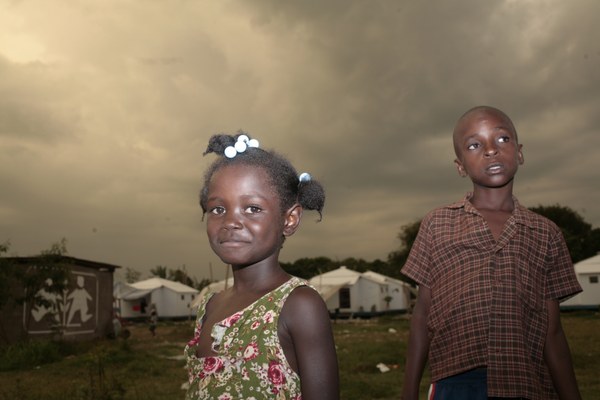Haiti news: Georg Willeit returns to Port-au-Prince

Georg Willeit returns to Haiti nine months on and asks whats in store for Haiti's future
Austrian Georg Willeit was on site in Haiti just a week after the earthquake: his purpose - to co-ordinate international communications for SOS Children's Villages for a month and help with every possible logistical challenge during this critical first phase. Nine months later he returned to Port-au-Prince:
What will it be like this time, what will have changed, where has progress been made, if at all? With these questions in mind, I arrived in Haiti for the third time after the earthquake. At the same time though, I knew from my last visit in May not to expect too much.
The situation has calmed down now in the SOS Children's Village, the upheaval of the first few weeks has subsided, and everyday life has visibly returned to normal. Yet you need to take a closer look to notice that many things are no longer the same. The last shelters are only just being built on the huge sports ground of the SOS Children's Village in Santo - temporary, prefabricated little houses. The folded components lay for months on end, with customs firstly in the Dominican Republic and then in Haiti. Now they are finally providing the urgently needed relief. Until now an average of 20 children have lived in each of the family houses in the SOS Children's Village, and with all the admirable efforts of the SOS mothers it is good thing that more children can now be moved into the little houses with their carers.
I was surprised at the situation in the city of Port-au-Prince. Much of the rubble has now been cleared away, houses have been partially or completely demolished, and the condition of many houses has been surveyed and sorted into groups. Now the houses have been given red, yellow or green stamps, meaning "demolish", "renovate" or "OK without further work". In many parts of the city there is unfortunately far too much red and yellow. So the first impression is not quite as drastic in visual terms. Many locals, and even some outsiders who know Haiti, say: "The city has never been so clean and tidy". For someone like me, who witnessed Haiti for the first time just after the earthquake, it is almost impossible to believe.
On closer observation you realise that high stone walls have now been built around many of the emergency relief camps established since January. It makes sense for the people in the camps, who evidently had enough of living in a goldfish bowl. But now it's also as if these endlessly vast tented cities were no longer even there. Inside the camps the tents have been improved, while tarpaulin structures provide a reasonable level of shade and protection from the rain. And more than ever there is the danger that permanent slums will evolve from most of these original makeshift camps - barely visible from the outside, and a dramatic sight from within. The planned relocation to more substantial housing and camps protected from flooding has barely started.
What is tangible and visible is a heightened sense of dissatisfaction and impatience among the people, who are now more likely to approach you and beg. This time I also felt that the security situation was relatively tense. It is certainly not advisable now to set foot in a camp without the presence of a camp official. What is difficult for outsiders to comprehend is the discrepancy between the population's understandable urgent needs and impatience and the slow pace of the authorities. The work of every NGO is hampered by bureaucratic restrictions, whether it is customs or tax-related red tape, or virtually intangible contacts in the authorities. Now there is the additional complication of elections being held in November. Sixty eight different lists are standing, and this too is slowing down all the decision-making processes because no one knows if he or she will still be in office at the end of November.

 Return to Schools Wikipedia Home page…
Return to Schools Wikipedia Home page…
